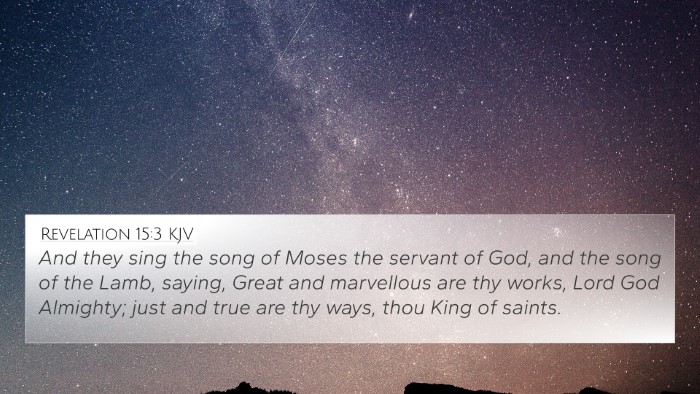Bible Verse Interpretation: Psalms 57:11
Psalms 57:11 states, "Be exalted, O God, above the heavens; let your glory be over all the earth."
This verse serves as a powerful declaration of God's supremacy and glory. It encapsulates the psalmist's deep desire for God's name and might to be recognized and revered above all creation. Through the insights of various public domain commentaries such as those by Matthew Henry, Albert Barnes, and Adam Clarke, we can gain a deeper understanding of the themes and implications of this verse.
Summary of Insights
According to Matthew Henry, this verse expresses the psalmist’s yearning for God’s exaltation and the acknowledgment of His glory globally. It serves as a prayer that God’s greatness should be recognized not only within Israel but across the entire world.
Albert Barnes emphasizes the importance of God's glory being above the heavens. He highlights that God's majesty surpasses all earthly powers and influences, suggesting that true worship recognizes this hierarchy.
Adam Clarke provides a contextual analysis, indicating that the call for God's exaltation may stem from a situation of distress or persecution, exemplifying the need for divine intervention and glorification amidst circumstances that threaten faith.
Key Themes of Psalms 57:11
- Exaltation of God: The verse emphasizes the need for God to be honored above all else.
- Divine Glory: It acknowledges the magnificence of God’s glory that should be recognized universally.
- Global Recognition: Encourages believers to take part in spreading the acknowledgment of God's greatness across nations.
- Faith in Distress: Reflects a prayerful request for God's intervention in times of trouble.
Bible Cross References
The following are notable cross-references that can deepen the understanding of Psalms 57:11:
- Psalm 108:5: "Be exalted, O God, above the heavens; and your glory above all the earth."
- Isaiah 6:3: "Holy, holy, holy is the Lord of hosts; the whole earth is full of his glory!"
- Philippians 2:9-11: "...God has highly exalted him and bestowed on him the name that is above every name..."
- Revelation 19:1: "...Alleluia! Salvation and glory and honor and power unto the Lord our God!"
- 1 Chronicles 16:27: "Splendor and majesty are before him; strength and joy are in his dwelling place."
- Psalm 145:12: "To make known to the sons of men his mighty acts, and the glorious majesty of his kingdom."
- Habakkuk 2:14: "For the earth will be filled with the knowledge of the glory of the Lord as the waters cover the sea."
Thematic Connections and Comparative Analysis
When conducting a comparative Bible verse analysis, one can observe thematic connections between Psalms 57:11 and several other scriptural references. The repeating motifs of God's glory, holiness, and global recognition align across various books of the Bible, establishing a profound inter-Biblical dialogue.
Tools for Bible cross-referencing allow for deeper engagement with these texts. By using a Bible concordance or a Bible cross-reference guide, readers can identify and explore how similar themes appear throughout Scripture. For example, both Isaiah 6:3 and Psalm 108:5 echo the call to exalt God, reinforcing the idea of divine supremacy.
Using Cross-References in Bible Study
Understanding how to use Bible cross-references can enhance personal study and sermon preparation. By recognizing patterns and parallels in scripture, individuals can develop a comprehensive view of God's glory and majesty as portrayed throughout the Bible. Cross-referencing Bible study methods allow for identifying connections between Old and New Testament writings that reveal a holistic understanding of God’s nature.
Conclusion
Psalms 57:11 serves as a profound reminder of God's exalted position and the call for believers to acknowledge His glory globally. It encourages continuous reflection on the divine nature of God and the need for mankind to honor Him above all. Engaging in dynamic cross-referencing and thematic exploration will undoubtedly enhance one's biblical understanding and spiritual growth.






